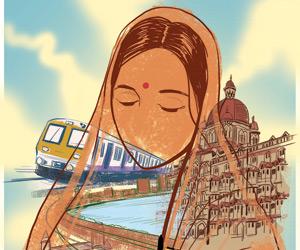And so it was March of 1993, that I was working in an advertising agency that faced the old passport office


Illustration/Uday Mohite
ADVERTISEMENT
 And so it was March of 1993, that I was working in an advertising agency that faced the old passport office. News had filtered in that afternoon that two bombs had gone off, one in the Share Bazaar, the second at the Air India building.
And so it was March of 1993, that I was working in an advertising agency that faced the old passport office. News had filtered in that afternoon that two bombs had gone off, one in the Share Bazaar, the second at the Air India building.
Then suddenly boom, out of nowhere there was a massive explosion outside our window. Shattered glass lay all around us, as a huge pall of brown smoke rose into the air. A BEST bus had driven over the third bomb. (Nine more were to go off through that fateful Black Friday.) But as the dark vapour cleared, and amidst the panic that enveloped Prabhadevi, the first sight I saw was this — regular Bombayites, just passers-by, stopping taxis and motorists, and piling their injured and charred brethren into these vehicles and taking them to, I assumed hospitals — the police, as 70s Hindi movies showed, were always the last to arrive on the scene — there was no hesitation, as these city folk assumed that if a crisis occurred, you helped, no questions asked, whether official help was at hand or not.
And I remember thinking about the soul of our city for the first time. The 1992 Mumbai riots that had preceded this, had opened up the city's underbelly — 'no cops, we cope' seemed to be a Bombay battle cry in a crisis. Stories of the average Mumbaikar coming to the aid of his fellow Mumbaikar filled our lives — even as caste battles were being fought in the 'gallis' of the metropolis. And so it was with some disappointment that this vital 'Mumbai soul' seemed to disappear in the succeeding years, as self-centredness culminated in an age of selfiedom.
Stories of bystanders watching crimes on our streets without lifting a finger to help — in fact taking callousness a step further by shooting selfies with the crimes as a backdrop.
Had collective kindness been killed at the altar of civic cynicism? — 'The Establishment doesn't give a shit, so why should I"?
And then last week 35,000 farmers came to town — and as usual one felt the usual 'heebie jeebies' when faced with similar 'protest invasions'. Obviously Mumbai will come to a standstill. Obviously the indignant 'kisans' with their nine demands were going to stride into the city and disrupt the already creaking infrastructure. There'd be huge traffic snarls — major diversions, 'why does everything have to happen in our city' was the silent refrain.
Then the farmers came, walking 180 km from Nashik, through the night mindful that kids had exams, mindful that their demands should not devastate a city of 20 million. And, on this one day, for me, Mumbai found her 'kindness mojo' again — that famous unity, that famed 'even if we don't have much we will share' ethos reappeared. Biscuits, dates, mineral water were distributed by individuals, welfare associations, political parties, and religious groups to the blister footed farmers.
Only two of the nine demands have been met — but now that's subject for a whole other column.
Rahul da Cunha is an adman, theatre director/playwright, photographer and traveller. Reach him at rahuldacunha62@gmail.com
Catch up on all the latest Mumbai news, crime news, current affairs, and also a complete guide on Mumbai from food to things to do and events across the city here. Also download the new mid-day Android and iOS apps to get latest updates
 Subscribe today by clicking the link and stay updated with the latest news!" Click here!
Subscribe today by clicking the link and stay updated with the latest news!" Click here!






